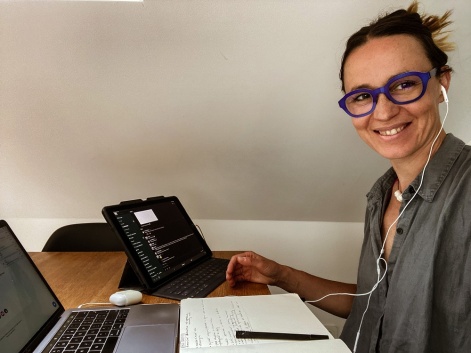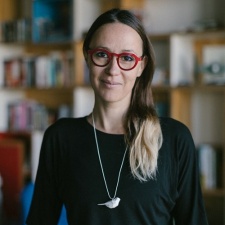The games industry plays host to a colourful cast of diverse individuals, from artists and coders to narrative designers and studio heads.
The skills to pull off these roles, however, are complex and differing, with each position requiring mastery in its field – especially in these complex times we are all living through at the minute.
To highlight some of the brilliant work that goes on behind the scenes as well as how employees around the world are adapting to the life of remote work, PocketGamer.biz is reaching out to the individuals who make up the games industry in our Jobs in Games: Remote Working series.
This week we spoke with Pixel Federation co-founder and chief learning officer Lucia Šicková.
PocketGamer.biz: Can you tell us about your current role and what it entails?
Lucia Šicková: I am one of the original co-founders, but I have taken a few breaks to spend time with my kids, only participating on small scale projects. I returned to the role five years ago and have been working on my long-term mission to create a learning mindset.
We have dedicated time and resources to create environments, systems, and tools that support personal growth. We evaluate our system on an annual basis and adjust it to our business needs, as well as taking on board feedback from both the team and management.
How did you first get into games and how did you progress into this role?
I discovered that the space is a perfect mix of creativity and structure where I can make the most of my skill set.Lucia Šicková
Prior to games, I was working for a telco firm in human resources. Then I moved to consult in HR-related roles while utilising any opportunity I had to volunteer in the creative industry.
When I met Simon (my now husband) who was already in gaming, I discovered that the space is a perfect mix of creativity and structure where I can make the most of my skill set. I have always loved working with creative people, yet I love being able to support them with my more structured thinking.
What did you study (if anything) to get your role? What courses would you advise for aspiring professionals in the area?
I studied economics and hated every moment of it. To be honest, I think it was more of the way I was taught than the actual subject itself. Later on, I studied more courses focused on people, systems, leadership, and culture, and took a course at Stanford Executive Education as a game executive.
Additionally, I took an education program at the Aalto University of Helsinki, where I learned numerous soft skills. There are tons of content online and offline at the moment. Anyone that is hungry enough to learn can find what they are looking for.
Do you think there are any misconceptions, public or professional, surrounding your area of expertise?
Absolutely, especially on the market in Slovakia. It's improving; however, gaming and game development is often mistaken for gambling. It's not taken as a possible serious career or business until you prove them wrong with business achievements and numbers.
I don't like using force to get to things, as I am a firm believer in creating understanding and getting to know the context that surrounds us.
What advice do you have for someone looking for a job in this profession?
Don't give up. There are many opportunities to enter the industry through schools, extra-curricular platforms, game jams, community meetups, conferences, internships, start- up competitions, angel investments etcetera.
Figure out what you want, where your passion is, what skills do you have and need, and that will help you find the right opportunities.
How has the shift from office to remote working impacted your role, if at all?
For me and my team, it was difficult at first. We feared that online would kill our work, but after a few days we adjusted to online. The company switched very quickly; in many areas we may even be more efficient, though there are portions where we feel the teams struggle such as with new processes, projects, teams.
My role has shifted a little too. My husband (also one of the co-founders and company’s CEO) and I, along with several friends have started a platform #ktopomozeslovensku, where we are fundraising to buy personal protective equipment (PPE), disinfection and other much-needed tools during the pandemic.
We've managed to raise over €1.3 million, ($1.47 million) to distribute thousands of gloves, shields, face masks, overalls and so on to over 300 cities and communities all around Slovakia.
Also, since I am a board member on the educational platform Butterfly Effect - which was heavily hit by the online environment - we also needed to make a lot of shifts there.On top of this, I have 3 kids so all of sudden, we were all home and had to find a way to live in a smaller space.
What does your typical day look like when working remotely?
I try to run in the mornings, so I can try to get some movement during the day. Then I would wake the kids up and make sure they all know when and where they need to login for their classes. Usually, at nine, the rollercoaster of Zoom calls begin.
What I believe makes the most sense is to leave the responsibility to team leads and let them manage how it best fits the project.Lucia Šicková
I literally go from one meeting to another: from people and educational activities in Pixel, through advisory and coordination calls in Butterfly Effect, to coordination calls with #ktopomozeslovensku regarding the app we have just launched.
Since I'm currently in an advisory role in a number of education-related organisations, there are a number of different meetings related to their challenges at the moment. I try to end the day at a normal time, approximately at six to be able to spend some time with the kids. Then if there is more work remaining, I will try to do a little more when the house is quieter.
What do you think are the biggest advantages and disadvantages of remote working?
What's great is that there is higher efficiency. The online space has its own rules. Communication is less natural and you need to prepare/structure calls more in order to be focused, as well as making sure people are engaged. You need to pay more attention to the dynamics, so it's heavier on organisers, managers, facilitators, but also makes it more accessible to participants.
What was very challenging was working with people who have kids as it was harder for them to focus. Finding educational activities were challenging at first but then we figured out a way.
Is there anything you wish you had known before moving to remote working?
It's great that we are still agile and innovative at heart. It was surprisingly easy to jump online as the tools we use now is the same in the offline world - Slack, Zoom, Teams, VPN, mail and such. What I wish I had known was that the pandemic would last longer than three months. I would have planned better, though who could have known this?
Do you have any advice for others who are struggling to adjust to remote work?
Take it one step at a time. Look where you would like to be and plan the small steps on how to get there. Look at what you have already and what works, then build on that. And be patient with yourself and the team. It's not easy to get right the first time.

After the pandemic ends and if you were given the choice, would you prefer to continue working remotely or go back to working in an office?
That's a good question. I don't have a clear answer. It was easy to be in the office from home with everything locked down and everyone home.
Now we are in a state where people and companies are going back to the office in small groups, it will be a challenge for those who are at home. What I believe makes the most sense is to leave the responsibility to team leads and let them manage how it best fits the project.





















